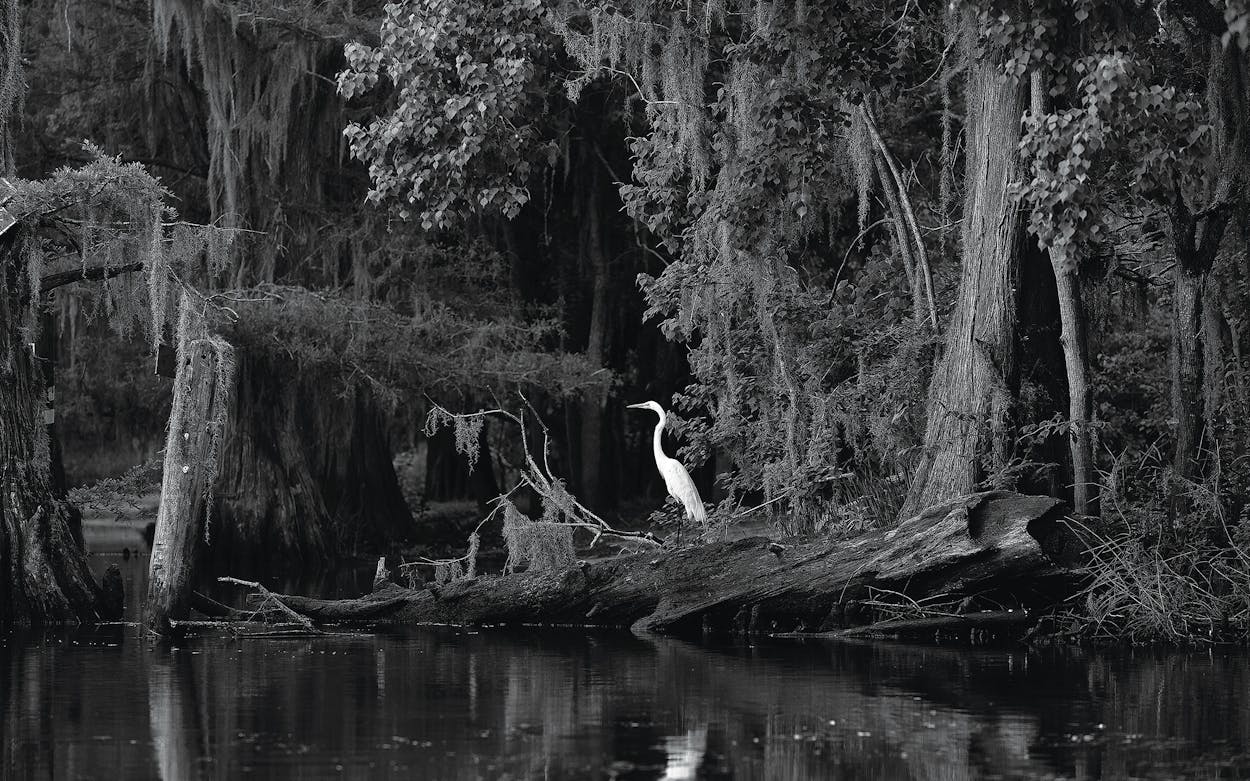Dottie Carter is an 83-year-old retired schoolteacher and the owner of Spatterdock Guest Houses, in the East Texas town of Uncertain, which sits on the southern shore of Caddo Lake.
When I was growing up, every man in Uncertain had a pistol and a bottle of whiskey in his front seat. I mean, that was just life. It was a wild time—and it was fun.
My friends and I had our own boats. Our parents would fill up our gas tanks and send us out first thing in the morning with Hershey’s bars and Dr Peppers. We didn’t come home till we ran down on gas.
In the early fifties, Daddy opened an airstrip and lodge called Fly ’n’ Fish Lodge. At that time, there were just fishing camps here in Uncertain. All of a sudden, this man puts in a two-story structure with a restaurant, dance hall, and nice motel rooms. It was very high-tech for the area.
Shortly after that, Texas began to build all these water reservoirs, and Caddo took a dip. You know how the fishing is good in a new lake? A lot of fishermen took their loyalty elsewhere. It was really hard on the marinas. There used to be little bait shops and boat rentals everywhere. A lot of that folded. I saw the transition of Caddo from a fishing lake to its discovery by people who love Caddo for its beauty and peacefulness.
In the sixties, I went off to college and married a city boy. You know, bright lights. It didn’t take me long to discover I was not a city girl, and I missed home. Then Daddy died, in 1969. When the opportunity came to buy Fly ’n’ Fish Lodge from my family’s estate, I jumped on it. I moved back to Caddo with my kids in 1970 and bought a little place on Taylor Island, next door to the lake house where I’d spent most of my childhood.
I gave my two kids boats at age nine, so they learned the lake the same way I did. They’d go out and stay all day. I probably should have worried about them, but I never worried about my kids when they were on the lake.
In half a century, Caddo Lake has not changed much. Fifty years ago, we had the invasive species water hyacinth. Then came hydrilla. The state treated that by spraying it with diesel. There were no precautions. Since 2006 we’ve had giant salvinia. It’s really bad. It’s a floating plant that doubles in size once a week. We have eight airboats spraying two hundred days a year with an herbicide that is not supposed to harm the fish or the trees. We also have the weevil program, which grows insects to eat the salvinia, but that’s a real slow fix.
People love Caddo, and they’re very careful to protect it. We still have no rules. I mean, we have rules, but nobody follows them. That’s the good news and the bad news. It’s the same places with the same wonderful names: Hog Wallow, Whangdoodle Pass, Red Belly.
It’s hard to make a living down here, but anybody can learn to be a plumber or work in construction. They just have to learn the hard way. My partner, Billy Carter, was a fishing and hunting guide on the lake. He also owned Johnson’s Ranch, the oldest inland marina in Texas. Billy was such a character and a charismatic man. He and I were older when we got together, and we lived a wacko, crazy life. We just kept having fun. The grief was horrible for me when I lost Billy, in May 2021, but I’m okay now.
The scenery on Caddo Lake is unlike any other lake in Texas—and I’m not knocking those other lakes. They’re okay, but they’re not Caddo. I drove to Marshall yesterday. When I came home, I actually stopped on the bridge. I said, “Damn, this is so beautiful. It’s where I want to be.”
This interview has been edited for clarity and length.
This article originally appeared in the February 2023 issue of Texas Monthly with the headline “Caddo Lake Memories.” Subscribe today.









